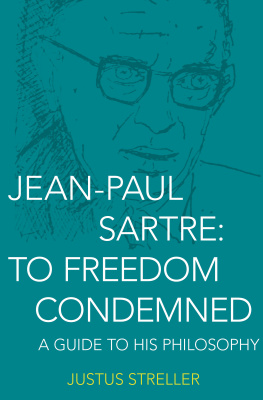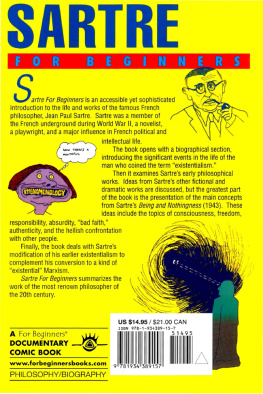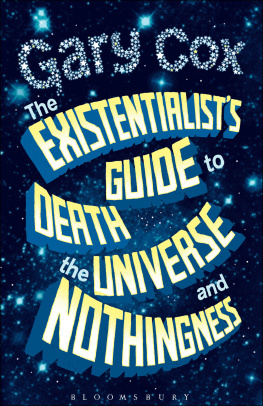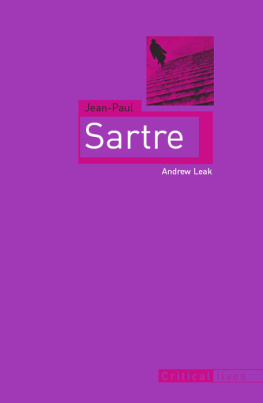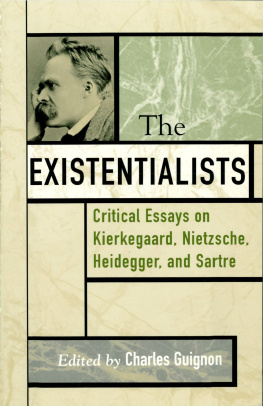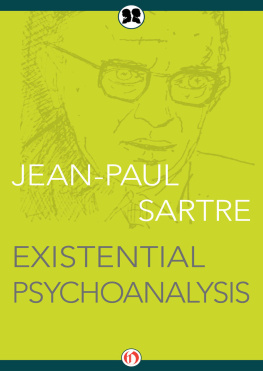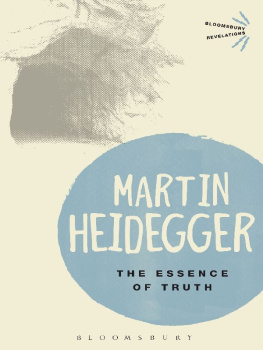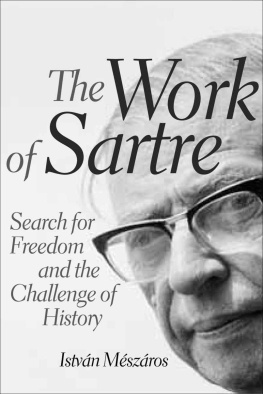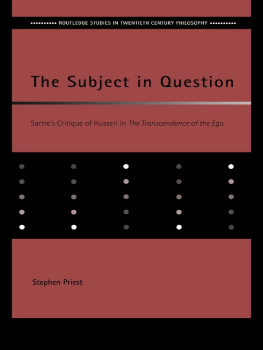Jean-Paul Sartre: To Freedom Condemned
A Guide to His Philosophy
Justus Streller
Translated with an introduction by
Wade Baskin
Philosophical Library

CONTENTS
TRANSLATORS INTRODUCTION
If defined loosely (and no rigid definition suits everyone who feels qualified to express an opinion on the subject) as a system of philosophy evolved from the notion that existence is prior to essence, that man is responsible for his actions, and that mans freedom to choose what he will be is both a blessing and a curse, existenialism is probably as old as thought. Yet the much abused word generally suggests to the American reader the name of the French thinker whose literary and philosophical publications first attracted attention from all quarters during the early post-war years. And still today Jean-Paul Sartre stands as the most articulateand the most prolificof modern existentialists. Even so, it is probably safe to assume that few readers have taken the trouble to read in its entirety the one work that would allow them to settle once and for all a controversial question: Is the colorful author of the shocking plays and scandalous novels that have popularized existentialism a serious philosopher or an opportunistic charlatan? Being and Nothingness, Sartres main philosophical work, is proof positive of his sincerity and the indispensable clue to all his activities; in it he probed with startling insight the notions that turn up again in all his novels and plays as well as in all his other expository writings. The present volume represents an attempt on the part of the late Dr. Justus Streller to distill and set down in an orderly fashion the substance of Sartres monumental study of the structure of mans being and of the significance of mans freedom.
Though Sartre is typical in most respects of the modern French intellectual, his adroit omniscience and his varied accomplishments make it impossible for his severest critics to dismiss him as a littrateur or even to challenge him on speculative grounds. Educated in Paris, where he was born on June 21, 1905, he takes his place beside an imposing group of French thinkers who, like Descartes and Comte, have not hesitated to break with tradition in following up a new insight. He attended the Lyce de la Rochelle and the Lyce Louis-le-Grand before entering the Ecole Normale Suprieure; there he majored in philosophy and, in 1929, graduated with high honors. He began his teaching career in provincial secondary schools (Laon, Havre) but managed during the same period (1929-34) to travel and study in Egypt, Greece, Italy, and Germany, where he was a pensionnaire at the Institut Franais. His studies in philosophy introduced him to the work of Edmund Husserl, Martin Heidegger, and Sren Kierkegaard; soon after his return to France (1935), he published his first philosophical works, studies of the imagination and of the emotions. Until he joined the army as a private in 1939, he taught at the Lyce Pasteur at Neuilly. Sent to the Maginot Line, he was captured and held prisoner for several months. Following his repatriation in the spring of 1941, he returned to the Lyce Pasteur. He moved from there to the Lyce Condorcet but soon gave up his post in order to devote all his time to writing.
Always active in the Resistance movement, Sartre managed to continue publishing despite the censors. Being and Nothingness, which appeared in 1943, was a real tour de force in that it demonstrated the ability of the French to out-speculate the Germans. During the same year Sartre completed The Flies, an open condemnation of all forms of tyranny, which somehow eluded the censors in spite of its message. As a result of his fame as a philosopher and his success as a dramatist and novelist (five novels and two plays appeared 1938-45), after World War II ended, Sartre was acclaimed as the undisputed leader of French intellectuals. As the chief existentialist, the uninhibited conversationalist drew crowds to the Caf de la Flore, where he was accustomed to write and to relax with his followers. A legendary figure even before his major philosophical work was translated into English, he traveled widely through the United States (1945-46) and lectured at various universities. Since that time he has continued to write indefatigably; he has covered a wide range of subjects, including literature, esthetics, economics, sociology, and politics. His political views have alienated many of his American readers, but alienation has apparently failed to mollify his stand on crucial issues. He now devotes most of his time to the editing of the monthly journal which he founded (1946), Les Temps Modernes.
Before he undertook to abstract and classify the seminal ideas of Sartres master work, Dr. Streller published a German translation of its most significant parts. Dr. Streller intended in his exposition of Being and Nothingness to draw together related ideas covering a wide range of topics and thereby to provide a concise introduction to the substructure of all of Sartres fictional works. A comprehensive view of this substructure will contribute to an understanding and appreciation of the novels and dramas on which much of Sartres fame rests, and which are in turn intended mainly to serve as introductions to or illustrations of his theory of existentialism. Without tergiversation, Dr. Streller guides the reader through Sartres treatment of the complexities, absurdities, and paradoxes of human existence. By calling attention to certain affinities to Hegel, Heidegger, and Husserl, he brings into focus Sartres originalityfor example, his discovery of the Look, which as in the legend of Medusa turns to stone (an object) the one who is looked at (the subject). Painstakingly he brings together scattered statements and pinpoints fertile ideas relating to such seemingly disparate topics as bad faith, anguish, transcendence, the Other, consciousness, love, God, death, and freedom. To Freedom Condemned is a compact and well-ordered restatement of the essence of Sartres compendious Being and Nothingness.
W ADE B ASKIN
Southeastern State College
Note
Quotations from Sartres original text follow in the main the English translation of Professor Hazel E. Barnes (Philosophical Library, 1956). In drawing up definitions for the items in the Key to Special Terminology, I have also consulted freely Professor Barnes valuable work.
W.B.
THINGS
Things are exactly what they are and as they are; that is, they possess being-in-itself and are in themselves. They exist in pure positivity but are also purely contingentunfounded and without the possibility of having a foundation. They simply are. Their being is absolute.
A thing unsatisfied with its existence and desirous of establishing for itself a foundation must become aware of itself through reflection. It must achieve separation from itself. Obviously, however, it can effect a separation only by splitting in two and keeping its parts distinct. This it accomplishes through the instrumentality of nothingness. It follows that a thing in order to be able to reflect on itself and provide for itself a foundation must contain nothingness. Through pure positivity it is transformed into a negativity, into something that contains nothingness. It is no longer in itself, no longer coincident with itself, but only present with respect to itself. It is no longer in itself but for itself. It is no longer a thing, an in-itself; it is a for-itself. And the for-itself possesses consciousness; this means that it possesses at the same time freedom and can select ends. Because it selects and pursues ends, the for-itself acquires individuality. It becomes a man. Choosing and pusuing ends is coincident with the emergence of the for-itself.
Next page
